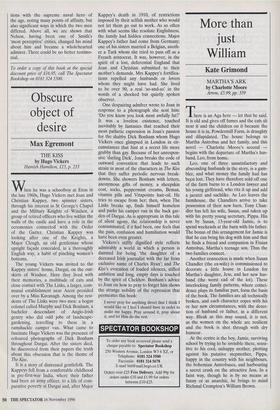Obscure object of desire
Max Egremont
THE KISS by Hugo Vickers Hamish Hamilton, £15, p. 233 hen he was a schoolboy at Eton in the late 1960s, Hugo Vickers met Joan and Christian Kappey, two spinster sisters, through his interest in St George's Chapel and the Military Knights of Windsor, a group of retired officers who live within the walls of the castle and have a role in the ceremonies connected with the Order of the Garter. Christian Kappey was looking after one of the Knights, a Major Clough, an old gentleman whose upright façade concealed, in a thoroughly English way, a habit of pinching women's bottoms.
The young Vickers was invited to the Kappey sisters' house, Dargai, on the out- skirts of Windsor. Here they lived with their memories, a multitude of cats and close contact with The Links, a larger, com- munal establishment near Ascot presided over by a Miss Kavanagh. Among the resi- dents of The Links were two men: a bogus colonel called Murphy and Dick Bonham, a bachelor descendant of Anglo-Irish gentry who did odd jobs of landscape- gardening, travelling to these in a ramshackle camper van. What came to fascinate Hugo Vickers was the presence of coloured photographs of Dick Bonham throughout Dargai. After the sisters died, he discovered from their papers the truth about this obsession that is the theme of The Kiss.
It is a story of distressed gentlefolk. The Kappeys fell from a comfortable childhood in pre-first-war India, where their father had been an army officer, to a life of com- parative poverty at Dargai and, after Major Kappey's death in 1910, of restrictions imposed by their selfish mother who would not let them go out to work. As so often with what seems like resolute Englishness, the family had hidden connections. Major Kappey's father had come from Germany; one of his sisters married a Belgian, anoth- er a Turk whom she tried to pass off as a French aristocrat. It was, however, in the spirit of a lost, deferential England that Joan and Christian submitted to their mother's demands. Mrs Kappey's fortifica- tions repelled any husbands or lovers whom they might have had. She lived to be over 90, a real 'so-and-so' in the words of a shocked but quietly spoken observer.
One despairing admirer wrote to Joan in response to a photograph she sent him: `Do you know you look most awfully fat?' It was a loveless existence, touched inevitably by fantasies that reached their most pathetic expression in Joan's passion for the shabby Dick Bonham whom Hugo Vickers once glimpsed in London in cir- cumstances that hint at a secret life more grubby than gay. Because of her unrespon- sive 'darling Dick', Joan breaks the code of outward convention that leads to such strain in most of the characters in The Kiss that they suffer periodic nervous break- downs. She showers Bonham with letters, anonymous gifts of money, a sheepskin coat, socks, peppermint creams, Bemax, vitamin pills and Vitapointe hair-oil. He tries to escape from her; then, when The Links breaks up, finds himself homeless and parks his camper van in the back gar- den of Dargai. As is appropriate in this tale of silent agony, the relationship is never consummated; if it had been, one feels that the pain, confusion and humiliation would have been even greater.
Vickers's stiffly dignified style reflects admirably a world in which a person is damned for being 'the daughter of a deceased Irish journalist with the far from exclusive name of Charles Ryan'; and The Kiss's evocation of loaded silences, stifled ambition and long, empty days is touched by the spirit of Chekhov. Bonham's advice to Joan on how to pray to forget him shows the strange nobility of the repression that permeates this book: I never pray for anything direct that I think I would like or I feel I should have in order to make me happy. Pray around it, pray about it, and let Him do the rest.


















































































 Previous page
Previous page